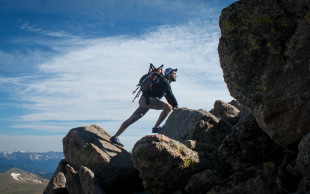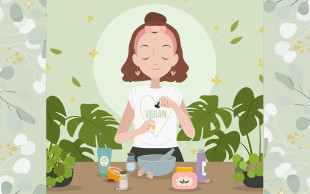STYLEGUIDE sits down with Dan Wong from A Good Citizen to discuss how he became an artist, from the dire times as he was starting out to eventually becoming an established creative maverick in staid Singapore.
How did you get started initially and what inspired you to do what you do?
At the tender age of 17, I attended a Nanyang Polytechnic open house. So there I was, extremely inspired by the 3D technology and I saw these human figures doing things and they were all in 3D, just like the games I play. And I thought: "Hmm! Maybe I can create pornography with these 3D models".
When I was younger, my first experience with art was not in any conventional sense. I would vandalise school toilets—drawing genitalia or human beings and figures in power. I would draw them in pencil, because I don't want the cleaning auntie to have a hard time.
After I started my course at NYP, I fell in love with the act of drawing. It was with the support, encouragement and companionship of a couple of like-minded friends that got me into this as well. We experienced the joy of drawing together and I think that was when I realised that I’m happy when I draw.
How did you feel? Were you uncertain about the future back then?
Definitely. I think army played a big part in my uncertainty, because it did hold me back quite a bit. I don't deny that the things I learnt in army were very valuable. I learnt a lot about getting stuff done, about dealing with people you don't like, but it did cost me a lot of grief to stick to my trade—because drawing is something you have to practice constantly and constantly, and you have to develop a habit of drawing if you want to be good at it.
I had to learn how to draw in adverse conditions, like keeping a dirty sketchbook outfield. I had to learn how to observe the things around me and draw them, instead of copying from my favourite manga. I had to set these habits into place so that I could continue drawing even though I was still in army, and it required a lot of self-discipline.
I failed a lot. I'd be like, "Okay, this weekend when I book-out I must go and start on this illustration in a month, which means I got 8 book-out days to do this project.” Oftentimes, I lapsed. I’d go home and just play games, then suddenly, book-in already! Wah, then I’ll get very depressed and play Green Day songs.
So that was one of the challenges.
How did you feel or cope with this cynicism about your craft?
A lot of times I cope by going back to drawing. It's a bit like a release, or an escape if you will, like if you are really into a drawing and engrossed in it, then you fall into this alpha state where you don't really worry about other things, other than the picture—in fact, your entire life is simplified. You just need to worry about that detail in front of you—that arm, that face, the colour of that nose, so I don't have to look at the big picture and worry about it.
I just need to focus my entire life and being on that one thing that's in front of me. So that's the fun part in the act of drawing: It simplifies your complicated life and helps you ignore people around you.
What were some things about your business or personal life that made you dissatisfied with the way things were?
I've encountered artists before who were both the left-brain and right-brain kind of people, so they're able to handle the practical utilitarian aspects of running a business and solving problems, while still having that creative edge on things. They're able to straddle both realms simultaneously.
I have a difficulty doing that. Either I'm in one realm, or the other. I have to learn how to constantly be in both worlds at the same time.
When did you realise that you couldn't really handle both as well as others could?
For me, the symptom is burning out. When I'm burning out, I cannot maintain my concentration or my focus and my discipline starts slipping. I start doing irrational things, or lash out at other people.
Some of the articles that I've read online that I’ve found effective recommend that you divide your day into inviolable compartments.
Let's say your morning is nothing but admin, nothing but numbers, sending invoices, chasing money, business development and left-brain stuff.
After lunch you take a coffee or a nap, and when you're ready to start work again, your 3pm to 8pm is nothing but creative work. So even if somebody sends you a mail about an aspect of business, or even if someone comes over and says, "Oh, I need this numbers thing done", your inviolable rule cannot be touched.
I'm doing my painting means I'm doing my painting.
Again, the whole concept is based on the fact that your compartmentalisation is inviolable. Nobody can cross—no client, no parent, no spouse, nothing.
It has its flaws, but it's the best solution that I have now for myself.
What were some of the biggest challenges you faced, in life or business?
I was berated by my girlfriend for not spending enough time with her, and I can understand where she's coming from. The problem about doing this full-time is that you become very obsessed with your work. You spend a lot of time cooped up in front of the computer in your office and don't pay attention to your friends, parents, girlfriend and cat.
I neglected my social life, which is unhealthy. I feel that the reason why I'm a little bit more balanced now is because I put in time and effort to hang out with my loved ones and spend more time in observing the world instead of always, working and worrying about the business, the artwork, and the solution.
What was the lowest point that you've felt?
The lowest point was just after I graduated from University. I had no money, because I had spent all my working money from my job on pocket money while in university. I had very little cash, and because I used to be from the games industry, I got a little cocky—I was like, “Plenty of game companies will hire me! My level of skills and portfolio have improved so much, surely I will get a job within the next month.”
You have no idea how wrong I was.
During this time, my finances were dwindling and I went into doing freelance work. However I didn't know how to manage a freelance business then. I didn't know how to market myself. I didn't know how to hustle. I just thought, "If you're good at drawing, surely people will hire you".
In the end, my next gainful employment was to be a year later.
What is the change that you will want to make in this world?
I would like to entertain people more! I know it’s a very shallow thing (laughter). I’m not solving any problems like some of the entrepreneurs are out there doing. I’m not contributing to any of these aspects of society that involve sustainability or food waste or caring for people, or the less-abled.
I want everybody to have a higher quality of life simply because there’s something to laugh at or poke fun of, to feel that life isn’t mundane, normal or boring.
I think we also don’t have a culture of satire. I think that because of how our country is run, we just don’t have the attitude of laughing at ourselves.
And I think if you can identify who you are and laugh at the things that make up your identity, even the bad things—it grows you as a person.
Where do you get your ideas from?
My creative process involves taking a dump—that's one major aspect! I think of ideas while travelling between places. My creative process also involves sketching and drawing. A lot of times when I'm stuck, I just head to the sketchbook and let the pen run free. I also come up with new ideas by purposely going against the flow!
For example during SG50, my work was selected to be an opening piece in an exhibition along Orchard Road; the brief given to celebrate Singapore’s independence. So I decided that it will not be a time of celebration but a time of danger, a time of struggle… it'll be dark and gritty!
I came up with this artwork "Dire Staits". It depicts the old guard leaders carrying Singapore away from Malaysia in shark-infested waters.
Sometimes if a problem presents itself, I like to tackle the problem by thinking of how to make it worse, sort of a contrarian approach as a way to start the engine. If we know what makes it worse, we might be able to deconstruct the process.
What is your greatest inspiration in Life?
My greatest inspiration in life ... that’s a very hard question to answer! (laughter)
I watched a documentary about Jiro Ono, a Japanese gentleman who owns a sushi place. The documentary is called ‘Jiro Dreams of Sushi’ and it talks of Jiro’s intense obsession with sushi. What struck me was the sheer amount of dedication that he handles his sushi, all the way from the minor details of how the sushi is presented, to where the fish is from.
And every single person that he puts on to his sushi pipeline, from the guy who selects the fish and brings it to his restaurant to the people who help him and the people he trains… his attitude trickles down to them.
All have the same amount of intensity in terms of how much care and dedication is put into an aspect of the sushi.
Jiro’s attitude is something I seek to emulate.
What does success mean to you, and what is the greatest success you've achieved?
I think that success happens if my work engages my audiences in a relationship.
I feel successful when I get the attention and celebration, when I’m validated and recognised for the work that I do.
The greatest success I’ve achieved is when someone stops and stares at my work for a long time.
What is the most interesting life experience you've had so far?
Oh, when I went to India I stayed for a while in Varanasi. Varanasi is a place by the river in India where the full experience of India can be had. People there are very comfortable with the concept of Death. In Varanasi, there are places along the Ganges river called ghats, which is a place where everything happens. You can bathe there and you can bury your dead there. They're so intimate with death.
Let's say a friend has passed away, they'll put his body in linen cloth, set him aflame and cast him adrift on the Mother Ganges river. So there's this corpse-burning smell all the time. And after that, they can just take a bath in the same river, where the friend’s dead body is. They can go take a bath, brush their teeth, and maybe even take a bucket of water home to boil.
It's very natural for them. You go there and you're freaked out, but to them, it's life. And if we Singaporeans go there, and just a little bit of that Ganges water touches your tongue, you'll have tummy cramps and fall sick. But for them, they're used to it.
What advice would you give to your younger self?
I would tell the kid to work smarter!
When I was younger, I tackled a lot of my problems head on and in a manner that is like, “If I just work hard enough, if I just keep at it, if I just keep practicing and practicing and persisting, I’ll win!”
I didn’t see the patterns in things. Instead I’d just bullheadedly draw or practice without considering the creative, conceptual or aesthetic aspects.
I didn’t see the patterns in what makes things good, or what makes things funny. I didn’t spend time to think about crafting the concept and crafting the gag or crafting the narrative.
I just kept going, “Argh, draw better, draw better!”
But that’s very vague and not very clever.
What are your hopes and aspiration for the future?
I hope to reach out to more people with my work. I wish to improve in my craft. I would like to create an ideal way of life for myself in Singapore. I desire to be healthy and have a work-life balance. I seek to be able to entertain people in a manner that I have not done before.
I want to know myself even more intimately, and I hope to be able to use that knowledge to find a way to relate better to the world.
















